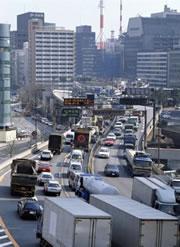 Restrictions on fuel type and quality — including stricter regulations on diesel-engine exhaust emissions imposed in Tokyo in 2003 — are now helping to clear the air.Punchstock
Restrictions on fuel type and quality — including stricter regulations on diesel-engine exhaust emissions imposed in Tokyo in 2003 — are now helping to clear the air.PunchstockAsthma patients in Tokyo today welcomed a monetary settlement from car manufacturers and the Japanese government, according to a report in Agence France Presse. The payment resolves a decade-long legal battle in which asthmatics blamed diesel traffic fumes for their illness.
The lawsuit had been filed by hundreds of Tokyo residents, starting in 1996. In 2002, the Tokyo District Court ruled that the government could be held liable for the asthma of some of the plaintiffs, but rejected claims against the car manufacturers. After an appeal, the Tokyo High Court recommended that the various parties negotiate a settlement to end the issue.
The automakers, including industry giants Toyota, Honda and Nissan, will provide a one-time payment of 1.2 billion yen to the plaintiffs, and a further 3.3 billion yen (US$28.6 million) to support a five-year health plan. The central government and Tokyo Metropolitan government will contribute 6 billion yen each to a medical programme for the patients.
Dirt in the air
The particulates in diesel fuel are clearly linked to respiratory problems, which can in turn lead to death.
In Jakarta, Indonesia's capital and one of the world's most polluted megacities, airborne soot and other particles were shown in 2002 to be responsible for more than a million asthma attacks and several thousand premature deaths a year (see 'Megacity, mega mess...')
In cities around the world, pollution from cars and factories continues to be a huge concern. In Beijing, government officials today began a four-day experiment to see how taking 1.3 million cars off the streets will affect air pollution. This is in an effort to work out how best to clear the air for that city's upcoming Olympic games. The government is also relocating or closing down factories and changing home fuel use to cut down on haze, which can affect athlete performance (see 'Gasping for victory').
Restrictions on fuel type and quality — including stricter regulations on diesel-engine exhaust emissions imposed in Tokyo in 2003 — are helping to clean up the air around the world. Overall, the planet's level of air pollution has been improving over the past few decades (see 'Clear skies end global dimming ').
ADVERTISEMENT
It isn't common for patients to sue over exposure to traffic pollution, although in 2002 a jury awarded US$625,000 to a railroad employee in the United States who claimed that his asthma was the result of inhaling diesel fumes while on the job.
Environmental groups and individual states have also previously launched lawsuits in attempts to force the federal government and/or industry to clean up the air, for the benefit of both the general public's health and the climate.
Visit our suffererswhoblamedca.html">newsblog to read and post comments about this story.
